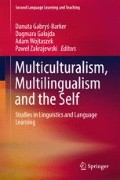Abstract
The issues of language impoliteness, verbal aggression and taboo violation have only recently come under a more intensive scientific scrutiny. The present paper gives a brief discussion of the problems of verbal taboos and swearing from a cross-linguistic perspective. The central question addressed here is to what extent different themes recurring in verbal aggression are universal across cultures and to what extent they are particular to given languages. There appears to be a fairly universal set of topics which speakers of different languages use in the activity of swearing. However, there are some interesting individual characteristics across cultures, which pertain to the presence and strength of particular taboos. Taboos and swearing are also subject to constant cultural evolution. The degree of universality of particular taboo subjects may depend on whether a particular taboo has primarily biological or cultural motivations.
Access this chapter
Tax calculation will be finalised at checkout
Purchases are for personal use only
Notes
- 1.
All Biblical references have been taken from The Holy Bible: Today’s New International Version. (2005). Grand Rapids, Michigan: Zondervan.
- 2.
Translation mine—Ł. M.
- 3.
Translation mine—Ł. M.
References
Allan, K., & Burridge, K. (2006). Forbidden words: Taboo and the censoring of language. Cambridge: Cambridge University Press.
Banek, K. (2007). Historia religii: religie niechrześcijańskie. Kraków: NOMOS.
Bousfield, D. (2008). Impoliteness in interaction. Amsterdam, Philadelphia: John Benjamins Publishing Company.
Bousfield, D., & Locher, M. A. (Eds.). (2008). Impoliteness in language: Studies on its interplay with power in theory and practice. Berlin, New York: Mouton de Gruyter.
Burridge, K. (2006a). Taboo, euphemism, and political correctness. In K. Brown (Ed. in chief), Encyclopedia of language and linguistics, (2nd ed., Vol. 12, pp. 455–462). Amsterdam: Elsevier.
Burridge, K. (2006b). Taboo words. In K. Brown (Ed. in chief), Encyclopedia of language and linguistics, (2nd ed., Vol. 12, pp. 452–455). Amsterdam: Elsevier.
Bussmann, H. (1998). Routledge dictionary of language and linguistics. London, New York: Routledge.
Cibien, C. (2010). Modlitwa. Kielce: Jedność.
Crystal, D. (1995). The Cambridge encyclopedia of the English language. Cambridge: Cambridge University Press.
Gebert, K. (2004). Egzegeza pisma w judaizmie. In P. Chruszczewski (Ed.), Perspektywy dyskursu religijnego, czyli przyjęcie Kaina, Język a komunikacja 5 (Vol. 2, pp. 77–97). Kraków: Tertium.
Hughes, G. (1991). Swearing: A social history of foul language, oaths and profanity in English. Oxford, Cambridge: Blackwell.
Jay, T. (1992). Cursing in America. Philadelphia, Amsterdam: John Benjamins.
Jay, T. (2000). Why we curse: A neuro-psycho-social theory of speech. Philadelphia, Amsterdam: John Benjamins.
Keller, J., Kotański, W., Tyloch, W., & Kupis, B. (Eds.). (1988). Zarys dziejów religii. Warszawa: Iskry.
Ljung, M. (2011). Swearing: A cross-cultural linguistic study. New York: Palgrave Macmillan.
Merlan, F. (2006). Taboo: Verbal practices. In K. Brown (Ed. in chief), Encyclopedia of language and linguistics (2nd Ed., Vol. 12, pp. 462–466). Amsterdam: Elsevier.
Pearsall, J. (Ed.). (1998). The new Oxford dictionary of English. Oxford: Clarendon Press.
Pinker, S. (2008). The stuff of thought: Language as a window into human nature. London: Penguin.
Sacher, J. (2012). How to swear around the world. San Francisco, California: Chronicle Books. Retrieved from https://pl.scribd.com/read/239947202/How-to-Swear-Around-the-World
Wajnryb, R. (2005). Expletive deleted: A good look at bad language. New York: Free Press.
Author information
Authors and Affiliations
Corresponding author
Editor information
Editors and Affiliations
Rights and permissions
Copyright information
© 2017 Springer International Publishing AG
About this chapter
Cite this chapter
Matusz, Ł. (2017). Taboos and Swearing: Cross-Linguistic Universalities and Peculiarities. In: Gabryś-Barker, D., Gałajda, D., Wojtaszek, A., Zakrajewski, P. (eds) Multiculturalism, Multilingualism and the Self. Second Language Learning and Teaching. Springer, Cham. https://doi.org/10.1007/978-3-319-56892-8_3
Download citation
DOI: https://doi.org/10.1007/978-3-319-56892-8_3
Published:
Publisher Name: Springer, Cham
Print ISBN: 978-3-319-56891-1
Online ISBN: 978-3-319-56892-8
eBook Packages: EducationEducation (R0)

